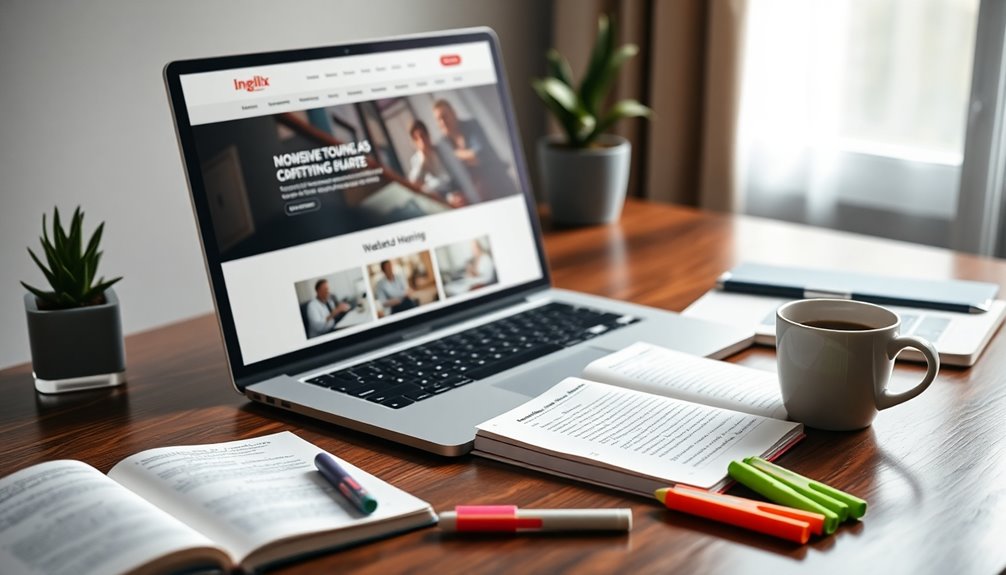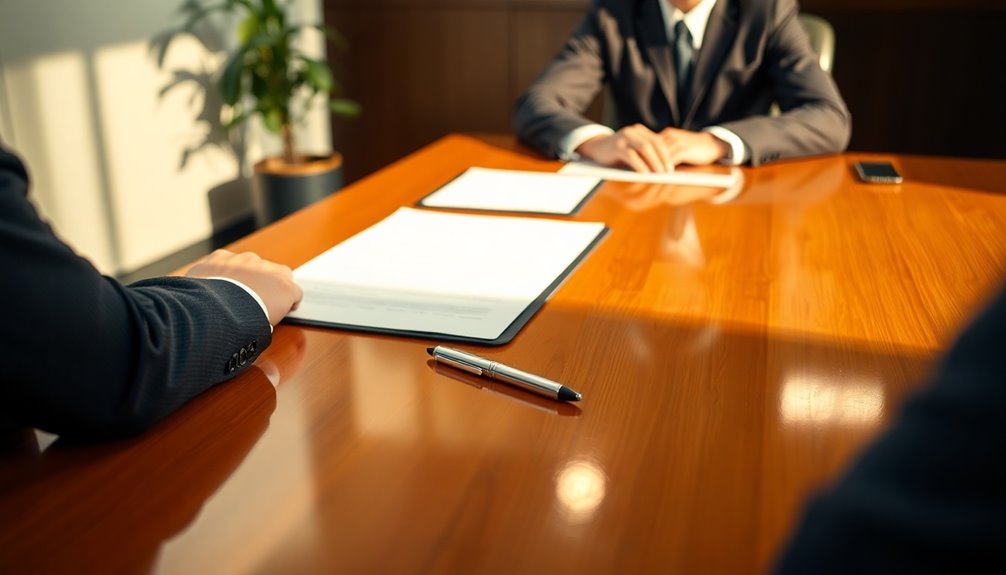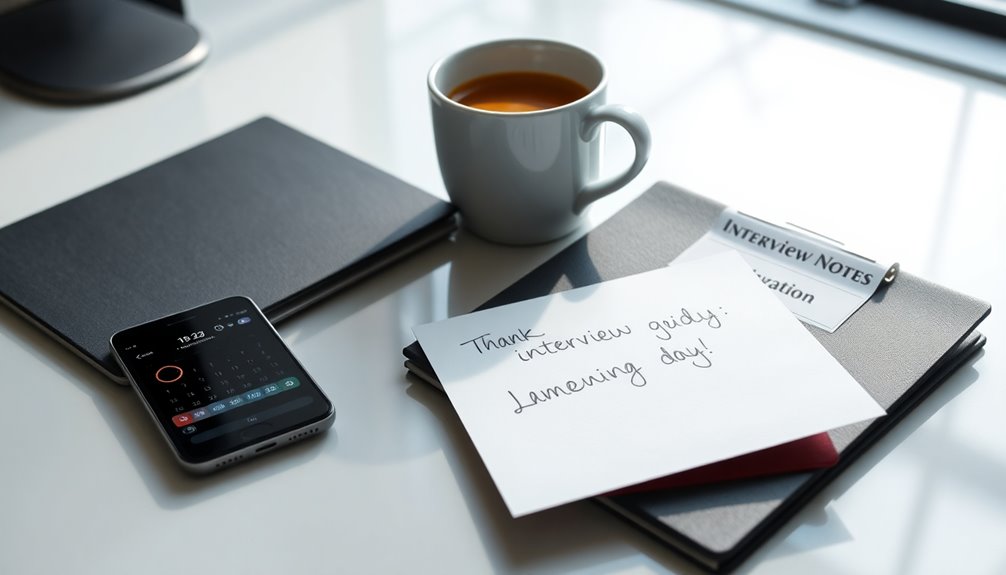To pass a job interview, you need to master key strategies. Start by researching the company and practicing common questions. Dress appropriately and arrive 10-15 minutes early to show punctuality. Make a strong first impression with a smile and firm handshake. Maintain confident body language and clearly highlight your achievements, aligning them with the company's values. Ask insightful questions to demonstrate your interest and engage with the interviewer. Finally, follow up within 24 hours to express gratitude and reinforce your enthusiasm. With these tips, you'll stand out and enhance your chances of success, and there's more to explore!
Key Takeaways
- Research the company thoroughly to align your skills with their mission and values, showcasing your commitment and fit for the role.
- Practice common interview questions using the STAR method to provide structured, relevant responses that highlight your achievements.
- Dress appropriately and maintain professional appearance to create a strong first impression and convey your seriousness about the opportunity.
- Use positive body language, such as maintaining eye contact and an open posture, to demonstrate confidence and enthusiasm during the interview.
- Send a personalized follow-up note within 24 hours to express gratitude and reiterate your interest in the position, reinforcing a positive impression.
Research the Company

When preparing for a job interview, understanding the company is essential. To stand out, you should research the company thoroughly. Start by familiarizing yourself with its mission statement, core values, and key initiatives. This alignment with their goals can impress your interviewers and show that you're a good fit for their culture.
Next, analyze recent news articles about the company to discuss its latest developments, challenges, and successes. Being up-to-date demonstrates your genuine interest and initiative. Don't forget to check the company's social media presence, as it offers insights into their culture, community engagement, and employee experiences.
You should also identify the company's top competitors. This knowledge allows you to articulate how your skills and experiences can strengthen their market position. Finally, prepare specific examples of how your personal values and professional experiences resonate with the company's objectives. By doing so, you reinforce your suitability for the role and show that you can contribute positively to the team. Remember, thorough research not only boosts your confidence but also equips you with the tools to engage meaningfully during the interview.
Prepare for Common Questions

To succeed in your interview, start by researching common questions you might face, like those about your strengths and weaknesses. Tailor your responses to highlight your unique qualifications and fit for the company culture. Finally, practice with scenarios to boost your confidence and improve your ability to articulate your thoughts clearly.
Research Common Questions
While preparing for a job interview, researching common questions is essential for your success. Start by compiling a list of typical interview inquiries like "Tell me about yourself" and "What are your strengths and weaknesses?" Don't forget to include behavioral questions, which often require you to provide specific examples from your experience. Use the STAR method to structure your responses—this will help you clearly articulate the Situation, Task, Action, and Result related to your experiences, showcasing your skills effectively.
Additionally, explore research about the specific company you're interviewing with. Many organizations have unique themes or values that often reflect in their common interview questions. Tailoring your answers to align with these values can give you an edge. Prepare personalized responses to avoid clichés; focus on your unique experiences and how they relate to the position.
Lastly, anticipate follow-up questions based on your initial answers. This preparation demonstrates depth of thought and shows the interviewer that you're genuinely engaged in the conversation. By taking the time to research common interview questions, you'll feel more confident and ready to impress.
Tailor Your Responses
After you've researched common questions, it's time to tailor your responses for maximum impact. This step can make all the difference in how the interviewer perceives you. Here are three job interview tips to help you craft effective answers:
- Use the STAR Method: For behavioral questions, structure your responses using Situation, Task, Action, and Result. This clear method showcases your thought process and results.
- Personalize Your Answers: Reflect on your unique experiences and skills. Avoid generic replies that lack authenticity. Instead, share stories that highlight your strengths and contributions.
- Anticipate Follow-Up Questions: Consider how your initial answers might lead to deeper inquiries. This preparation allows you to elaborate on your experiences, demonstrating a thorough understanding of your accomplishments.
Additionally, understanding how to tailor your narratives to align with the employer's interests can significantly enhance your interview performance.
Practice With Scenarios
Practicing with scenarios is essential for feeling prepared and confident during your job interview. Start by compiling a list of common interview questions, like "Tell me about yourself" and "What are your strengths and weaknesses." This way, you can practice thoughtful responses that reflect your skills and experiences, steering clear of clichés.
Utilize the STAR method (Situation, Task, Action, Result) to structure your answers, especially for behavioral questions. This approach guarantees your responses are clear and relevant, showcasing your problem-solving abilities effectively. Anticipate follow-up questions based on your initial answers; this will help you engage in a dynamic conversation during the interview.
Mock interviews with friends or mentors can also be a game-changer. Simulating real interview scenarios allows you to refine your speaking and presentation skills. It's not just about knowing the answers; it's about delivering them with confidence. The more you practice, the more natural it will feel. So, take the time to prepare, and you'll walk into that interview ready to impress.
Dress Appropriately

Dressing appropriately for an interview is essential, as it reflects your understanding of the company's culture. Choose professional attire that fits the environment, and don't forget to prioritize neat grooming. A polished look not only shows you mean business but also helps boost your confidence during the interview.
Understand Company Culture
Understanding company culture is essential when preparing for a job interview, and one of the most visible ways to demonstrate this is through your attire. To make sure you fit in with the workplace vibe, follow these steps:
- Research the dress code: Check the company's website, social media, and employee photos. This will help you understand company culture and what's deemed appropriate.
- Opt for slightly more formal attire: When in doubt, it's better to err on the side of professionalism. This shows that you're serious about the opportunity.
- Consider the role: If you're applying for a client-facing position, lean towards more formal clothing. Behind-the-scenes roles may allow for a more relaxed look.
Make sure your outfit is clean, well-fitted, and free of distractions. The first impression you make can greatly impact the interviewer's perception of your suitability for the company. By understanding company culture and dressing appropriately, you're setting yourself up for success in your job interview.
Choose Professional Attire
Choosing the right professional attire for your job interview can greatly influence the impression you make on potential employers. Start by selecting clothing that aligns with the company's culture. Solid colors are often seen as more professional and polished, so opt for those whenever possible. If you're uncertain about the dress code, it's wise to overdress slightly; appearing more formal is generally better than being too casual.
Make sure your professional attire is clean, well-fitted, and free from wrinkles. This attention to detail showcases your professionalism and respect for the opportunity. Keep accessories to a minimum to avoid distractions—simple and subtle jewelry is best.
While I won't explore grooming just yet, remember that a polished appearance contributes considerably to your first impression. Your choice of professional attire sets the tone for the interview, so take time to reflect on each element carefully. By dressing appropriately, you not only reflect your understanding of the workplace environment but also demonstrate your commitment to making a positive impression.
Prioritize Neat Grooming
Neat grooming is essential for making a strong impression during your job interview. It not only reflects professionalism but also demonstrates respect for the company and its culture. When you prioritize neat grooming, you enhance your chances of being perceived as competent and credible.
To create a polished appearance, focus on these three key aspects:
- Clean Hair: Guarantee your hair is neatly styled. A fresh haircut or tidy up can make a big difference.
- Minimal Accessories: Keep jewelry and accessories to a minimum. Opt for simple, understated pieces that don't distract from your overall look.
- Appropriate Footwear: Choose shoes that are clean and professional. Make sure they complement your outfit and are comfortable for walking.
Before the interview, research the company's dress code. If they lean towards business casual, pick smart, neatly pressed clothing rather than overly formal attire. Solid colors are generally preferred, as they help you stand out without being distracting. By focusing on neat grooming, you're setting the stage for a confident first impression that speaks volumes about your professionalism.
Arrive on Time

Punctuality can make a significant difference in how you're perceived during a job interview. To demonstrate your commitment and professionalism, aim to arrive on time—specifically, at least 10-15 minutes early. This gives you the chance to settle in and reduces the risk of unexpected delays, such as traffic or construction.
Before heading out, confirm the interview location to avoid any last-minute confusion. Planning your route carefully can help guarantee that you arrive on time, allowing you to account for any potential hiccups along the way. When you arrive early, use that extra time wisely. Take a moment to relax, gather your thoughts, and review your notes or any questions you may have prepared.
Arriving early not only shows your punctuality but also reflects positively on your time management skills—qualities that employers highly value. Remember, being late can create a negative first impression that could linger throughout the interview. By prioritizing punctuality and making a concerted effort to arrive on time, you set a positive tone for the rest of your meeting and showcase your readiness for the opportunity ahead.
Make a Strong First Impression

Making a strong first impression is vital for setting the tone of your job interview. It can greatly influence how the interviewer perceives your fit for the role. Here's how you can make that impression count:
- Greet with a genuine smile and firm handshake: This establishes immediate rapport and conveys confidence.
- Maintain strong eye contact: It shows engagement and sincerity, making you appear trustworthy and interested in the conversation.
- Dress appropriately: Choose solid colors that align with the company culture to project professionalism and readiness.
The first 30 seconds are essential, so guarantee your demeanor is positive and enthusiastic. Engage in light small talk as you walk to the interview room; this will create a comfortable atmosphere and showcase your interpersonal skills. Remember, the goal is to make the interviewer feel at ease while recognizing your confidence and professionalism. By implementing these strategies, you'll set a strong foundation for the rest of the interview. Make each moment count, and you'll be one step closer to landing the job!
Exhibit Confidence and Positivity

To make a lasting impact, you need to cultivate positive body language and practice confident speech techniques. Maintaining eye contact, standing tall, and using a firm handshake can all showcase your self-assurance. By combining these elements, you'll not only engage your interviewer but also create a dynamic presence that highlights your readiness for the role.
Cultivate Positive Body Language
During a job interview, positive body language can greatly impact the impression you leave on your interviewer. To effectively convey confidence and positivity, focus on these key elements of your body language:
- Posture: Maintain an upright posture and avoid crossing your arms. This indicates openness and confidence, making you appear more approachable.
- Eye Contact: Make consistent eye contact with the interviewer. This illustrates your engagement and genuine interest in the conversation, helping to build rapport.
- Gestures: Use purposeful hand gestures while speaking. Emphasizing key points with your hands can reinforce your message and make you seem more dynamic.
Additionally, lean slightly forward in your chair to show attentiveness and enthusiasm for the discussion. Practicing calm and controlled breathing can help manage any anxiety, allowing your body language to reflect true confidence. Remember, your body language speaks volumes even before you say a word. By cultivating positive body language, you not only enhance your own presence but also create a more inviting atmosphere for the interviewer, increasing your chances of success. Engaging in this practice can be seen as a form of philosophical exploration that encourages deeper self-reflection, ultimately aiding in your personal and professional growth.
Practice Confident Speech Techniques
Your speech techniques can greatly influence how confidently you come across in a job interview. To effectively convey confidence, practice speaking clearly and at a measured pace. This guarantees your message is understood and demonstrates your composure. Before the interview, use positive affirmations and visualization techniques to boost your self-esteem and project a confident demeanor.
Incorporating power poses or confident body language can also enhance your self-assurance. Stand tall and use open gestures while speaking to reinforce your confidence. Recording yourself while practicing responses to common interview questions allows you to identify areas for improvement in tone, clarity, and body language.
Engaging in mock interviews with friends or mentors is another effective strategy. Focus on maintaining a positive attitude and confident speech throughout the conversation. This not only helps you become comfortable with your responses but also reinforces the confident speech techniques you need to exhibit during the actual interview. Additionally, consider utilizing professional training to further enhance your speaking abilities and boost your overall confidence.
Sell Yourself Effectively

Selling yourself effectively in a job interview means showcasing your unique skills and experiences in a way that resonates with the employer's needs. To do this, focus on how your qualifications align with the job requirements. Here are three strategies to help you shine:
- Highlight Measurable Achievements: Prepare at least three strong points about your qualifications, emphasizing specific achievements that demonstrate your value. For example, mention how you increased sales by 20% in your last role.
- Use the STAR Method: Structure your responses using the Situation, Task, Action, Result (STAR) method. This clarity helps you articulate how you've successfully handled challenges and showcases your problem-solving abilities.
- Tailor Your Responses: Research the role and the company beforehand. This allows you to customize your answers to reflect their mission and how you can contribute to their goals, making your unique skills more relevant.
Ask Insightful Questions

Asking insightful questions at the end of a job interview can set you apart from other candidates. It shows that you're engaged and genuinely interested in the role and the company. Prepare a list of thoughtful questions based on your research about the organization's mission, values, and recent initiatives. This preparation demonstrates your commitment to the company's future. Additionally, asking about shared experiences can reveal how you might fit into the company culture and contribute positively to team dynamics.
Here's a simple table to guide your questions:
| Category | Sample Questions | Purpose |
|---|---|---|
| Day-to-Day Responsibilities | What does a typical day look like in this role? | Understand your fit within the team |
| Professional Development | Are there opportunities for growth here? | Show your commitment to improvement |
| Company Goals | What are the company's strategic goals for the next year? | Align your skills with future projects |
| Performance Evaluation | How is success measured in this position? | Ask for clarification on expectations |
These questions not only give you valuable insights but also allow you to assess whether the company aligns with your career aspirations. Engaging in this dialogue can leave a positive impression on your interviewers.
Leave a Lasting Impression

Leaving a lasting impression during a job interview is essential for standing out among candidates. First impressions are formed within the first 30 seconds, so you need to start strong. A warm smile and a firm handshake are vital to establishing rapport. Here are three key strategies to leave a memorable mark:
- Maintain Eye Contact: Keep eye contact throughout the conversation. This conveys confidence and shows you're engaged, which influences the interviewer's perception of your fit within the team.
- Exude Positive Demeanor: A positive attitude reflects your enthusiasm for the role. It creates a relaxed atmosphere, allowing for a more productive dialogue.
- Use Appropriate Body Language: Sit upright and lean slightly forward. This posture demonstrates your interest and attentiveness, showing the interviewer that you truly care about the conversation. Establishing a calm demeanor can also help model appropriate behavior throughout the interaction.
Follow Up After the Interview

Following up after an interview is an essential step that can greatly impact your chances of securing the job. Aim to send a follow-up note within 24 hours to express your gratitude and reaffirm your interest in the position. This simple gesture can positively influence hiring decisions.
In your thank-you email, reiterate key points discussed during the interview, and don't hesitate to address any topics you feel were overlooked. This indicates your continued interest and engagement. Personalizing your follow-up is vital; mention specific details like a shared interest or a particular topic you discussed to strengthen your connection with the interviewer.
Also, make sure to request information about the next steps in the hiring process. This illustrates your enthusiasm and proactive approach, which can set you apart from other candidates. Keep your follow-up concise and professional, as this reflects your communication skills and respect for the interviewer's time. Remember, following up after the interview not only reinforces your interest but also keeps you top of mind as the hiring decision is made.
Frequently Asked Questions
What Strategies Will You Use to Ensure Your Interview Is as Successful as Possible?
To guarantee your interview is successful, arrive 10-15 minutes early to settle your nerves. Research the company's culture and values, so you can tailor your responses effectively. Prepare for common questions using the STAR method, focusing on your achievements. Dress appropriately to make a positive first impression. Finally, don't forget to send a thank-you note within 24 hours, reminding them of your enthusiasm and interest in the position.
What Is the Star Method When Interviewing?
When you prepare for an interview, think of the STAR method as your guiding compass. It helps you navigate through behavioral questions by outlining the Situation, defining the Task, detailing the Action you took, and showcasing the Result. By using this structured approach, you're not just telling a story; you're painting a vivid picture of your skills and experiences. It's a powerful way to demonstrate problem-solving abilities that employers appreciate.
What Are the Five C's to Remember in an Interview?
When preparing for an interview, remember the five C's: Clarity, Confidence, Connection, Competence, and Curiosity. You need to communicate your thoughts clearly, showcasing your abilities confidently. Establish a connection with the interviewer through genuine conversation. Highlight your relevant skills and experiences to demonstrate competence. Finally, show your curiosity by asking insightful questions about the company. Focusing on these elements guarantees you present yourself as a strong candidate for the role.
What Is the Golden Rule in an Interview?
So, you think you can waltz into an interview and charm your way to the top, huh? Well, the golden rule is simple: treat everyone with respect. You never know who might hold the keys to your future. Build rapport, listen attentively, and keep that positive vibe flowing. Avoid trash-talking past employers—it's just bad form. And don't forget to send a thank-you note; it shows you care. Respect goes a long way!
Conclusion
Nailing a job interview is like preparing for a big game; every play counts. Just as athletes study their opponents, you need to research the company and practice your responses. Remember, the interview is your stage—dress to impress and make that first impression count. When you leave, it should feel like you've just scored the winning goal. Follow up, and keep the momentum going. With these strategies, you're not just a candidate; you're a contender ready to win!









